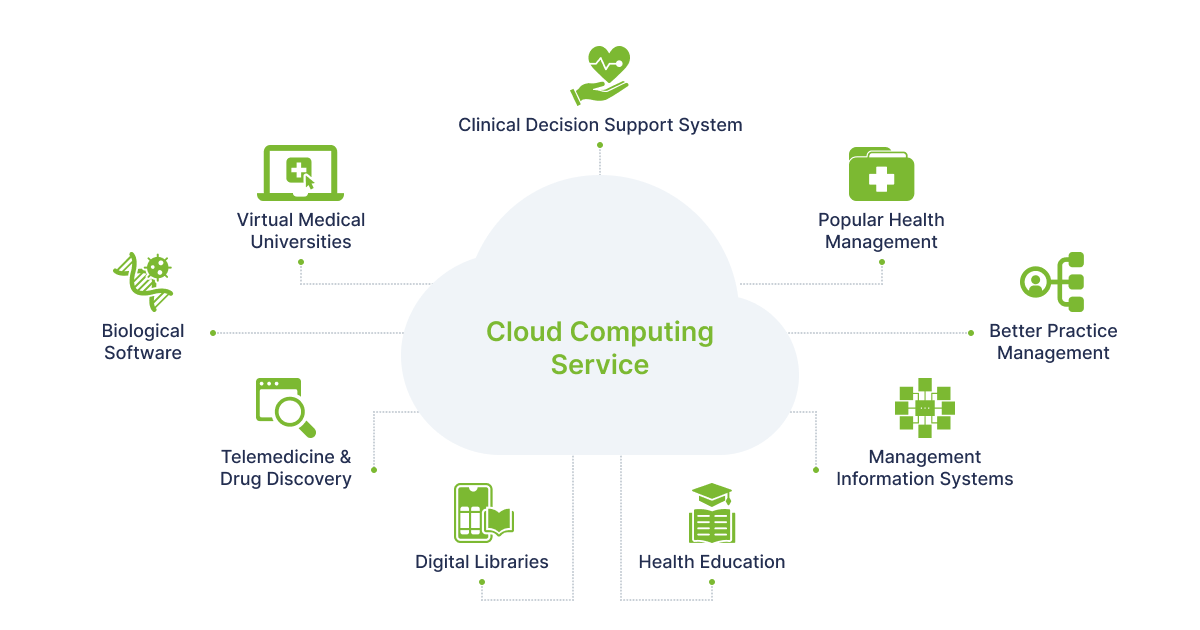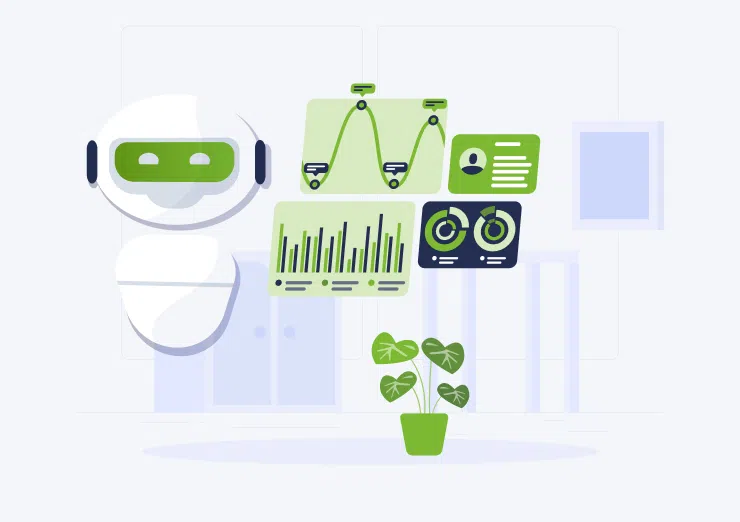Cloud Computing in Healthcare: Benefits, Use Cases and Challenges
Cloud computing technologies have been tightly integrated into modern business, including the healthcare sector. Keeping up with the constant changes in medicine and maintaining a high level of service delivery is only possible with the use of cloud solutions. If we consider segment of public clinics and private medical practice, cloud computing helps optimize the processes for collecting, storing, managing, and transmitting information. Thus, the problems of irrational use of finances, immobility, and bureaucracy of the system are solved. Most importantly, in practice, there is better and more efficient patient care, which is the main goal of any innovations in medicine.
The healthcare cloud market is projected to be worth more than $42 billion in 2027. This dynamic is due to the need to store and process a rapidly growing amount of data, as well as an increase in the number of structures that use cloud computing for health care. So, as of today, about 83% of organizations are already implementing cloud solutions in their management system to optimize costs and improve the quality of services. At the same time, the expected costs of maintaining cloud services by the end of 2023 will reach $600 billion.
What is cloud computing?
Cloud Computing is a collective term for the data storage, and for a computing device that are located on multiple servers and storage devices which are provided on request. The cloud computing service is provided on demand through a network of remote servers. Thus, a "cloud" is a network of remote centers in which data is processed and stored, and there is access to the use of a large number of people via Internet.
Cloud computing has made the process of centralized data storage simple and accessible, and its availability makes it possible to manage information and computing capacities from any device and at any time of the day. Previously, to use a working environment or a program on it, one had to visit an office or other physical place. Now it can be done from almost any point in the world, having access to the Internet.
Storing information in cloud services by healthcare structures simplifies the work of clinic staff, and enables secure access to data of medical structures.

How is cloud computing changing healthcare?
Optimising patient care, and improving work technologies are just a small part of the positive changes that have become possible due to cloud computing.
- The field of telemedicine provides access to the services of doctors, regardless of the location of both the patient and the doctor. Telemedicine and telesurgery applications use cloud computing for communication and technology adoption. The cloud service provides knowledge sharing and communication between health workers, the exchange of patient medical records, access to information on demand, and more efficient use of resources by eliminating unnecessary visits to the doctor.
- Search for drugs. Searching for chemical formulas requires powerful devices. An alternative to this will be the IaaS approach, which defines the right drugs and formulas in a matter of moments.
- Health management information system. Such solutions facilitate internal and external communication by improving the service of inquiries, billing, and human resource management.
- Electronic medical records. The cloud becomes a repository for patient medical records (PHR) and electronic health records (ENR), cloud computing makes it possible to easily control access to resources (from the patient - over patient records, from the organization - over electronic records).
- Clinical Decision Support System (CDSS). This is a program that functions like a doctor would. The expert system generates advice and recommendations based on the instructions of the practitioner who maintains the patient's medical record and also measurements of biometric data that are performed by fitness trackers and by smartphones for tracking important metrics. In addition, this technology is used to make diagnoses and write prescriptions.
- Medical online cloud libraries. Extensive data sets for doctors and students will be a great help, as they are updated with up-to-date data, research results, etc.
- Remote monitoring of patients. Remote access technologies make it possible to communicate with patients at a distance, collect and process information.
- The supply chain is another healthcare sector enhanced by cloud computing. With the help of services, medical structures manage patient data more efficiently to make the right decisions.
- With the help of cloud computing, applications for medical structures are created faster, and data processing and collection are performed more efficiently.
- Issuing prescriptions electronically, which guarantees a higher level of safety and relevance of prescriptions.
Types of Cloud Computing in Healthcare
Depending on the deployment environment and the services used for distribution, there are several types of cloud computing.
By deployment environment criteria:
- private cloud services. Control over them is carried out with the help of the IT department, which provides more control and security;
- public services - they are available on the Internet and managed by a third-party hosting provider. The most economical option;
- hybrid types, combining the features of the two types listed above.
As part of distributed service:
- SaaS (software as a service) - ready-made, customized web applications. The external party hosts application and manages it;
- PaaS (platform as a service) has an architecture where the means of development are managed by a remote cloud service provider. The responsibility of the supplier includes the tasks of providing software and hardware tools. Allows you to quickly launch and test applications;
- IaaS (infrastructure as a service) in which an external cloud provider hosts network servers and storage.
Read also: Best Practices of Security & Protection of Mobile Applications
Benefits of Cloud Computing in Healthcare
Integration of cloud solutions has several advantages:
- easy access to information. Thanks to cloud computing, it is possible to combine information from different sources, which enables to quickly make diagnoses, prescribe effective treatment and use information about patient treatment;
- cost reduction. Cloud services are cheaper than on-premises solutions. With automated data storage, there is no need to store data in physical space saves;
- optimization of processes, accelerated execution of tasks, including use of less expensive IT infrastructure;
- updating data security measures protects against information leakage, which, again, is cheaper than developing and maintaining someone’s security infrastructure;
- better patient care through data sharing, quick access to information, personalization of appointments and medical care;
- increased scalability. You pay only for the resources you use whereas renting equipment and software locally is carried out according to the advance payment scheme and results in big expenses;
- data access improves communication with patients;
- rapid response to changes in the healthcare organization;
- the probability of error tends to be zero, as well as the risk of information leakage.
|
Benefits of Cloud Computing in the Healthcare Industry |
Explanation |
|
Improved data accessibility |
Cloud computing enables healthcare providers to access patient data from anywhere and at any time, which can improve patient outcomes and streamline healthcare delivery. |
|
Reduced IT infrastructure costs |
Cloud computing eliminates the need for healthcare providers to invest in expensive IT infrastructure, such as servers and data storage facilities, which can save money and reduce overhead costs. |
|
Enhanced data security |
Cloud computing provides advanced security measures, such as data encryption, access controls, and multi-factor authentication, which can improve data security and reduce the risk of data breaches. |
|
Increased scalability |
Cloud computing enables healthcare providers to easily scale their IT resources up or down depending on their needs, which can reduce waste and improve efficiency. |
|
Facilitates collaboration |
Cloud computing enables healthcare providers to easily share patient data and collaborate on patient care, which can improve the quality of care and patient outcomes. |
|
Enables remote patient monitoring |
Cloud computing enables healthcare providers to remotely monitor patients' health conditions and vital signs, which can improve patient outcomes and reduce hospital readmissions. |
|
Supports disaster recovery |
Cloud computing provides reliable backup and disaster recovery capabilities, which can ensure that patient data is not lost in the event of a disaster or system failure. |
Company for creating cloud solutions in healthcare
Software Development Hub helps product teams and startups achieve their goals through IT outsourcing. We convert ideas into growth with 100+ like-minded software, web, and mobile engineering experts. Digital health, education, e-accounting, home automation, and security are only a few domains the SDH team has strong expertise.
Cloud architecture allows MIS Medstar to take a leading position in the Ukrainian market.
Dealing with this case, the SDH team provided development and business analysis outsourcing with full process coverage from design to system support. As of 2021, the system recorded an average of 120,000 appointments per day and more than 1.2 million e-prescriptions per month.
Contact SDH for advice on custom medical software development. Our experts will select the best approach to development, taking into account the wishes and business objectives of the client, and implement the idea at the highest level. We also ensure product compliance with regulatory standards such as HIPAA, HL7, CDA, CCD, QRDA, DICOM, NwHIN, and other regulatory standards for medical communication.
Categories
Share
Need a project estimate?
Drop us a line, and we provide you with a qualified consultation.









